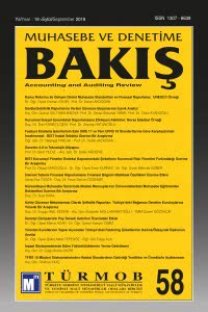BAŞARILI VE UZUN ÖMÜRLÜ AİLE ŞİRKETLERİNİN YOL HARİTASI: AİLE ANAYASASI
Kurumsallaşma, Aile şirketleri, Aile Anayasası, Kurumsal Yönetim
ROADMAP TO LONG TERM SUCCESS AND FAMILY-OWNED BUSINESS: THE FAMILY CONSTI
___
- Akbank, Deloitte, Sabancı Üniversitesi-EDU, TAİDER “Aile Şirketlerinde Sürdürülebilir Başarının Anahtarı”, 2016, https://www2.deloitte.com/content/dam/Deloitte/tr/Documents/risk/aile-sirketlerinde-surdurulebilir-basa- rinin-anahtarlari.pdf, Erişim: 9.9.2017.
- Aronoff, Craig, “Understanding family-business survival statistics”, Supply House Times, 2001, Volume 44, Issue 5, s. 34-35.
- Cadbury Committee, “The report of the committee on the financial aspects of corporate governance”, London, 1992. http://www.ecgi.org/codes/documents/cadbury.pdf, Erişim: 10.5.2017.
- Cadbury, Sir Adrian, Family firms and their governance: Creating tomorrow’s company from today’s, Egon Zehnder International, London, 2000.
- Çelik, Adnan, Abdullah Soysal ve Sedat Alıcı, “Aile İşletmelerinde Kuşak Çatışmasından Kaynaklanan Yönetim Sorunları: Kahramanmaraş Örneği”, 1. Aile İşletmeleri Kongresi, Tamer Koçel (Editör), 17-18 Nisan 2004.
- Christian G. Stewart, “How to Craft your own Family Constitution: An Overview”, 2013, http://www.familylegacyasia.com/whitepaper_pdf/Overview%20of%20how%20to%20craft%20a%20family%20cons- titution.pdf, Erişim: 9.10.2017.
- Deloitte, “Family Business Review”, 2017a, http://www.denetimnet.net/UserFiles/small_Family_ Business_Review_No2_Final_2_.pdf, Erişim: 10.5.2017.
- Deloitte, “What is ‘family governance’?: Getting to the heart of a much-used term”, 2017b, https://www2.deloitte.com/uk/en/pages/private-markets/articles/family-governance.html, Erişim: 15.6.2017.
- EC (European Commission), “Family Business”, https://ec.europa.eu/growth/smes/promoting-entrepreneurship/we- work-for/family-business_en , Erişim: 16.05.2017.
- Ediriweera, Amali, Anona AM. Armstrong ve Kumi Heenetigala, “Governance in Family Business: A Literature Review”, Journal of Business Systems, Governance & Ethics, 2015, Volume 10, Issue 2, s. 36-46.
- Esposito De Falco, Salvatore, Family Business: Ownership Governance and Management, Giappichelli Editore, Torino, 2016.
- Ho, Simon S. M. and Kar Shun Wong, “A study of the relationship between corporate governance structures and the extent of voluntary disclosure”, Journal of International Accounting, Auditing and Taxation, Summer 2001, Vol. 10, Issue 2, s. 139-156.
- IFC (International Finance Corporation), Aile Şirketleri Yönetim Rehberi, 2011.
- Jesover, Fianna ve Grant Kirkpatrick, “The revised OECD principles of corporate governance and their relevance to non OECD countries”, Corporate Governance: An International Review, 2005, Volume
- , Issue 2, s.127-136. Kardeş Selimoğlu, Seval, “Family Governance and Family Constitution: Turkey Case”, The 7th International Conference on Governance, Fraud, Ethics and Social Responsibility, 9-11 Aralık 2016 , İstanbul, Türkiye, sunum notları.
- Kardeş Selimoğlu, Seval, “Family Governance: Turkey Case”, The 6th International Conference on Governance, Fraud, Ethics and Social Responsibility 2015, 18-19 November 2015, Penang, Malaysia, sunum notları.
- Karpuzoğlu, Ebru, “Gelecek İçin Aile Anayasa”, 1. Aile İşletmeleri Kongresi, Tamer Koçel (Editör), 17-18 Nisan KPMG, “Constructing a family constitution”, 2010, http://www.fambiz.org.au/wp-content/uploads/Constructing- a-Family-Constitution-KPMG.pdf, Erişim: 11.09. 2017.
- KPMG, “Familiy Business Survey” 2015, https://assets.kpmg.com/content/dam/kpmg/pdf/2015/12/family-busi- ness-survey-2015.pdf, Erişim: 9.10.2017.
- La Porta, Rafael, Florencio Lopez-de-Silanes, ve Andrei Shleifer, “Corporate ownership around the world”, Journal of Finance, 1999, Volume 54, Issue 2, s. 471–517.
- Michael Braun, Scott Latham ve Emily Porschitz, “All together now: strategy mapping for family businesses”, Journal of Business Strategy, 2016, Volume 37, Issue 1, s. 3-10.
- Millstein, Ira ve OECD Business Sector Advisory Group on Corporate Governance, Corporate governance: improving competitiveness and access to capital in global markets: a report to the OECD, Paris, 1998.
- Millstein, Ira, “Corporate Governance: The Role of Market Forces”, The OECD Observer, 2000, No 221/222, p. 27-28.
- OECD (Organization for Economic Cooperation and Development), OECD Principles of Corporate Governance, 2004, https://www.oecd.org/corporate/ca/corporategovernanceprinciples/31557724.pdf, Erişim: 11.5.2017.
- OECD, (Organization for Economic Cooperation and Development) G20/OECD Principles of Corporate Governance, September 2015, https://www.oecd.org/daf/ca/Corporate-Governance-Principles-ENG.pdf, Erişim: 10.5.2017.
- Öner, Hale ve Özden Turhan “Aile İşletmelerinde Yönetim ve Kurumsallaşma: Kurukahveci Mehmet Efendi”, 4. Aile İşletmeleri Kongresi, Tamer Koçel (Editör), 16-17 Nisan 2010.
- Özsözgün Çalışkan, Arzu ve Hüseyin Güler, “Corporate Reporting on the Internet: An Investigation on Turkish Listed Companies”, İktisadi ve İdari Bilimler Dergisi, 2014, Cilt 36, Sayı 2, s. 251-274.
- PL (Finnish Family Firms Association) Good Corporate Governance in Family Business, 2009, http://www.perheyritys.fi/wp-content/uploads/2015/01/FINAL_Corporate_Governance.pdf, Erişim: 17.5.2017.
- Pounder, Paul, “Family business insights: an overview of the literature “, Journal of Family Business Management, 2015, Volume 5, Issue 1, s. 116 – 127.
- Sarbah, Alfred and Wen Xiao, “Good Corporate Governance Structures: A Must for Family Businesses”, Open Journal of Business and Management, 2015, Volume 3, s. 40-57.
- Tagiuri, Renato ve John Davis, “Bivalent attributes of the family firm”, Family business review, 1996, Volume 9, Issue 2, s. 199-208.
- Taylor Wessing, “The Family Constitution Guide”, 2014, https://united-kingdom.taylorwessing.com/documents/get /88/the-family-constitution-guide.pdf, Erişim: 11.09.2017
- TKYD (Türkiye Kurumsal Yönetim Derneği) ve Deloitte, Kurumsal Yönetim Serisi, “Aile Şirketleri İçin Adım, Adım Kurumsal Yönetim”, http://www.denetimnet.net/UserFiles/Documents/yay%C4%B1nlar/aile%20%C5%9Fir- ketleri%20i%C3%A7in%20ad%C4%B1m%20ad%C4%B1m.pdf, 2007, Erişim: 17.5.2017
- TKYD (Türkiye Kurumsal Yönetim Derneği), “Aile Şirketlerinin Anayasa Platformu”, Kurumsal Yönetim Dergisi, 2012, Sayı 16, s. 50-53.
- TKYD (Türkiye Kurumsal Yönetim Derneği), “Her İki Aile Şirketinden Biri Halen Kurumsallaşma Sürecinde”, 2017b, Kurumsal Yönetim Dergisi, Sayı 35, Sonbahar, 2017, s. 18-20.
- TKYD (Türkiye Kurumsal Yönetim Derneği), “Kurumsal Yönetim İlkeleri”, 2017a, www.tkyd.org , Erişim: 21.5.2017.
- TKYD (Türkiye Kurumsal Yönetim Derneği), Aile Şirketleri Yönetim Rehberi, 2013.
- Trevinyo-Rodríguez, Rosa Nely ve Nick Bontis, “The role of intellectual capital in Mexican family-based businesses: understanding their soul, brain and heart”, Journal of Information & Knowledge Management, 2007, Volume 6, Issue 03, s.189-200.
- Turner, Leslie ve Andrea B. Weickgenannt, Accounting Information Systems: Controls and Processes, Wiley, Uzay, Şaban, “Aile Anayasasının Oluşturulmasında Meslek Mensubunun Rolü”, Bursa SMM Odası, 1. Kurumsal Yönetim ve İç Kontrol Sempozyumu, 31 Mayıs, 2015, sunum notları.
- World Bank Group, “Corporate governance: a framework for implementation e overview”, 2000, http://documents.world- bank.org/curated/en/831651468781818619/pdf/30446.pdf, Erişim: 13.5.2017.
- Zellweger, Thomas, Managing The Family Business: The Theory and Practice, Edward Elgar Publishing Limited, 2017.
- ISSN: 1307-6639
- Yayın Aralığı: 3
- Başlangıç: 2000
- Yayıncı: TÜRMOB
HAM DERİ İŞLEME FİRMALARINDA MALİYETLEME VE MUHASEBELEŞTİRME
SEYHAN ÇİL KOÇYİĞİT, ŞÜKRAN GÜNGÖR TANÇ, BİLGE LEYLİ ELİTAŞ
ÇAĞNUR BALSARI, Zafer SAYAR, ALİ FATİH DALKILIÇ
SÜRDÜRÜLEBİLİRLİK RAPORU KAPSAMINDA ÇEVRESEL BİLGİLERİN RAPORLANMASI VE GÜVENCE DENETİMİ
YILDIZ ÖZERHAN, Banu SULTANOĞLU
TÜRKİYE’DEKİ DENETİM LİTERATÜRÜNÜN İÇERİK ANALİZİ (2007–2016)
HİLE BİLİNCİNİN ÖLÇÜLMESİNE YÖNELİK ÇALIŞANLAR ÜZERİNDE BİR ARAŞTIRMA
Fatma ULUCAN ÖZKUL, Zehra ÖZDEMİR
BAŞARILI VE UZUN ÖMÜRLÜ AİLE ŞİRKETLERİNİN YOL HARİTASI: AİLE ANAYASASI
